
Plymouth ad, 1966
I grew up in Detroit, Michigan; Motown, USA, in a family deeply involved in the automotive industry. My dad, with a partner, owned a Chrysler dealership and there was always a new car in the driveway (he’s the one just to the right of the car door holding his pith helmet with his arm out in the Featured photo dating from 1966; a full-page ad in our local paper when the new cars came in. The Detroit Auto Show was REALLY something). He usually drove an Imperial. It was huge! One even had a record player inside. I remember lying down on the plush carpet in the back.
Dad worked hard; six days and two nights a week. Mom had one of the first Valiants off the production line, a silver beauty. She had a maid five days a week who did all the cleaning, laundry and most of the cooking. We lived in a three bedroom house. Thinking back, I’ve wondered how there could be so much to clean on a daily basis.
Detroit is divided by mile markers, starting at the Detroit River, heading north. The city limit is 8 Mile Road (as in the Eminen song). We lived a block away on the north end of town. We also lived a block from the huge Woodlawn Cemetery, now the final resting place of the great Aretha Franklin, as well as Rosa Parks. This has become a famous cemetery, but when I grew up, it felt vaguely creepy to me. On Halloween it was just plain frightening. The night before Halloween is called “Devil’s Night” in Detroit. Supposedly, the dead spirits came out of their graves to haunt all of us, and there were obviously an abundance of them in close proximity to me. It was a time of mischief in Detroit. Kids came out to egg or TP houses, or worse. I was not a mischief-maker, but Detroit was notorious for this.
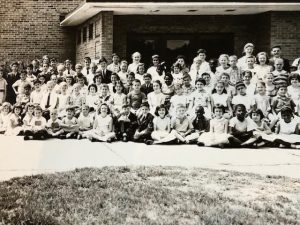
In front of my elementary school. I am in the second row, toward the left, short dark hair, bangs pushed back.
I attended the Louis Pasteur Elementary School at 19811 Stoepel Street, which was K-8, a huge place, racially diverse at the time (more so as the years passed). It was a good school, though over-crowded. The above photo was probably the first and second grades. I think I was in second grade at the time. I was surprised when I looked up the address, as my parents’ first house was on Stoepel. It was taken by the city by eminent domain (my parents were compensated) to build a public parking lot. The school, and my classrooms, were large; typically 30-32 kids to a room. Because of over-crowding issues, if you were born between December 1 and February 28, you started school at the semester break, in February, which I did (my birthday is December 10), so I was always half way through with a grade in June. Before entering high school, which did not have that weird off-set, kids went to summer school to make up the half grade and enter high school (no middle schools in my area of Detroit), ready for 9th grade. We moved to a near suburb, adjacent to the Detroit Zoo, when I was half way through 5th grade. I was tutored for four weeks in math and just skipped ahead to 6th grade; now the youngest in my class; not socially or physically mature.
After their first house was taken, my parents moved to 20209 Briarcliff Rd, which is the only house I ever knew in Detroit. It seemed like a great place to live. Briarcliff was just three blocks long, full of playmates for my brother and me. My best friend lived next door with two older sisters. A boy about my brother’s age, with an older sister, lived on the other side. I’m still in touch with the older sister.
The Good Humor truck drove up the street, clanging its bell in the summer and we’d all run out to get our treats. We played games like the “kick the can” or “hide and seek” until the street lights came on. Then we knew it was time to head home. I learned to ride a bike, going around the block from Briarcliff to Renfrew. My friends Joanie, Patty and Julie lived there and I could visit them. The brilliant journalist and political commentator, Michael Kinsley also lived around the corner on Renfrew. He was a few years older, but his sister Susan was my age and in my grade at school.
We called “soda”, “pop”, most notably, Faygo Red Pop, a local brand. The best was Vernor’s Ginger Ale, also brewed locally. Sander’s made the best fudge sauce and cupcakes. We would sit at the counter for ice cream sundaes.
Our house was small but seemed ideal to me. My parents had an en suite master bedroom at the top of the stairs. Rick and I had our own bedrooms around the corner from each other. We shared a bathroom with a tub (my parents just had a shower) near the stairs landing. No air conditioning, my father would put out a big floor fan opposite my brother’s room on hot summer nights to ventilate the rooms. One of my windows overlooked the driveway. I’d listen for my father’s car to pull in at night. Then I could rest comfortably, knowing that he was home.
When my brother’s tonsils were removed and he was bed-ridden for a week, my parents got their first “portable” TV, a huge thing on a cart that could be wheeled around upstairs. With my brother in bed, I’d join him watching American Bandstand in the late afternoon. I loved Frankie Avalon songs and sang “Venus” to the stars after the lights went off (“Venus, goddess of love that you are, surely the things that I ask, can’t be too great a task’). I was a dreamy, romantic child. The house TV was in the paneled den, where Rick and I watched The Mickey Mouse Club earlier in our lives (I loved Bobby Burgess). I did that instead of practicing the piano. I was hopeless. Sunday night, the family gathered there, three of us on the couch, my dad in his easy chair, and watched Ed Sullivan and other family entertainment. The house had a formal living room, but that was for birthday parties and piano practice.
A small kitchen, breakfast room and dining room completed the downstairs. Off the dining room was a great screened-in porch where we spent hot summer nights. Dad listened to baseball games on his transistor radio. We could smell the flowers from the garden (as described in The Flowers That Bloom in the Spring (Tra la)). The basement had a finished room where Rick’s Cub Scout troop met. We carved the Halloween pumpkin in the scrub sink next to the washer/dryer. And there was a storage room under the steps where we huddled for safety against the fierce Midwest storms.
It seemed like an ideal upbringing. Until the millage failed. The millage was the part of the property tax that paid for the school system. I was only 10 so didn’t understand it all entirely, but knew there was a ballot initiative to vote for higher taxes to fund the school system. My girl friends and I made signs and wandered through the neighborhood, campaigning in favor of the initiative, but it was voted down. My parents knew this meant the school system, already over-crowded, would go downhill rapidly. I was already enrolled in Liggett, a good private girls’s school (Gilda Radnor’s alma mater), but instead, they quickly found land in Huntington Woods, and a cousin built us a new house. It wasn’t quite complete in September, 1963 when the new school year started, so I commuted for a few weeks. It was larger than our current house, a center-entrance Colonial with 4 bedrooms, still 2 1/2 baths, but deep walk-in closets and central air conditioning. Of course it was new and modern, but I was happy where we were.
We sold Briarcliff Rd and moved to Huntington Woods on October 1, 1963. It seemed to mark an end to a happy period in my life. I returned to the old house once, with my own children, as described in Family Defined by Place. I found the neighborhood still quite nice, full of happy memories. The gentleman who owned my old house was kind enough to let us in and show us around. The house had changed little and I was happy to share it with my own small children, who were 8 and 4 years old at the time. The owner’s name, like my brother’s, was Richard. The house had come full circle. After the turbulent years in Huntington Woods, it brought me peace to see it again.
Retired from software sales long ago, two grown children. Theater major in college. Singer still, arts lover, involved in art museums locally (Greater Boston area). Originally from Detroit area.


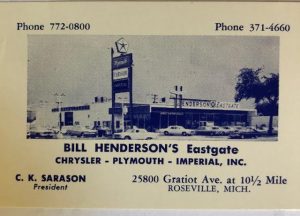

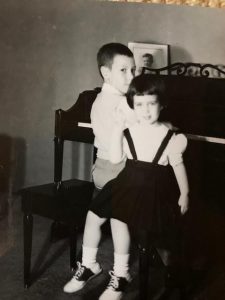
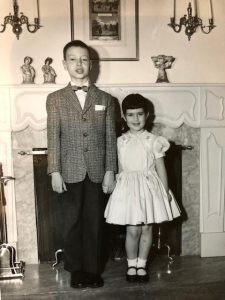
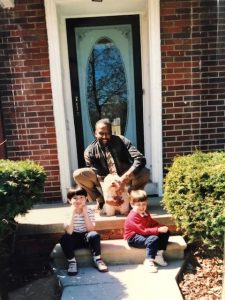

First of all, as usual, Betsy, you have a great featured image! How terrific that you still have a copy of the photo with your dad and his pith helmet.
And your story is, sadly, so evocative of what happened to Detroit starting in the 60’s, with the schools failing (the millage fail) and the “white flight” to the suburbs. And yet, as you note, you recall that as your happier childhood period.
I also love hearing about your re-visit to your original home, as described in more detail in one of your earlier stories. So nice that it seemed to be filling with more happy memories again. And also brought you some peace.
I am SO happy that I still have that full-page (it’s folded over) ad from the Detroit News! Classic, yes? Really sums up Detroit in that era, of which my dad and several other members of his family were a part.
White flight is exactly the right term for what took place after the millage failed, John. I was going to use it, but it feels so “not PC” right now, but is accurate. Within just a few years, the school system had fallen apart, and, as goes the school system, so goes property value. As I stated, I was 10 years old and didn’t entirely understand all the ramifications, but felt sad to be leaving that happy little house and the school, which truly was excellent when I attended. Yes, I have written about this before (and linked to the stories), but the move was tough for all concerned and changed the family dynamics forever. It was very nice to go back after 30 years and see the house and neighborhood were well-maintained and loved by new people. That was reassuring.
Betsy, brava as always on your amazing recall of time and place, and on the perfect photos always illustrating your stories.
Did you know Detroit’s JET/ Jewish Ensemble Theatre where we saw our actor-uncle perform?
Happy 4th, stay safe!
Thanks, Dana. Going through my albums, I was thrilled to come up with that newspaper ad including my dad! It really summed up Motown for me.
I have NOT heard of JET, but then, for all intents and purpose, I left Detroit for Brandeis at 17, spent little time there after that, and married at 21, moving away permanently. While my parents went to theater, opera and ballet, they did not see much in the way of Jewish ensembles.
Happy 4th to you as well. Have a safe one.
OMG, Betsy, as a sister Motown girl, I loved this! Faygo pop and Vernor’s, the Good Humor truck, 8 Mile Road, growing up with no AC, listening to Tigers games on a transistor radio… So many other familiar details. Thanks for sharing this.
Glad this brought back so many fun memories, dear fellow-Detroiter! Until I read your story, I didn’t realize how long you lived in Detroit-proper, before moving to Oak Park…a long time!
This was a fun story, Betsy, to learn what Detroit was like and the similarities and differences with northern New Jersey. We had “white flight” as well, and many people ended up in our town who had fled from the Newark area. By the time I was in high school our schools became overcrowded and in tenth grade we went on “double session.” I had chemistry at 7 AM and it was tough. Luckily, unlike what happened in your area, our school funding passed and the middle school became separate, so we were back to normal in our junior year.
That’s interesting, Marian. Glad your school system got the funding it needed and didn’t turn into another Detroit!
I love that you went back and actually got to walk through your old house on Briarcliff! I recently drove through my old neighborhood (dubbed, as I mentioned in my story, the “Black Beverly Hills”) but didn’t think to knock on the door of the house we lived in — now I wish I had! And now I wonder if our move had something to do with white flight. I always thought we moved simply because we outgrew the house. Thanks for such an evocative story, Betsy…as usual you make me feel as if I might have been there.
Thanks, Barb. As I mentioned to John, I deliberately did not use the term “white flight” in my story, but that’s exactly what happened when the millage failed. If you read the linked story, you see that I didn’t have the nerve to ring the doorbell when I took the kids to Briarcliff Rd; the mailman was walking by. I talked to him and HE rang the doorbell (I was parked in the driveway at that point…I looked pretty harmless with two little kids). Richard was SO nice. He was as interested as my kids were in my old stories. It was really a heartwarming event. He worked nights, his wife wasn’t there. I’m not sure she would have let us in; he said she wouldn’t have been happy because “the house wasn’t picked up the way she liked”, but it turned out so well.
Sometimes we just need some resolution.
Great story, Betsy, and as others have commented, that Plymouth ad with your father waving his pith helmet is sensational. We had Valiants too, as you know, first a 1960 with a push-button gear shift, and then the ’66 convertible that I wrote a story about. And my father had an Imperial for a while, in between Cadillacs, but it didn’t have a record player.
I knew Michael Kinsley at Harvard, he was a classmate, so it’s fun to find out that he was a neighbor of yours. And fascinating to learn about the millage fail (never heard that term before) causing your family to move to the suburbs. Since you were already in private school, I wonder why they felt the need to leave. Thanks for giving us a window into an interesting time in the history of Detroit, and probably big cities in general.
Wasn’t that push-button gear shift on the Valiant the best? The record player in the Imperial was a demonstration model I think. It was very sensitive and probably never went into production.
I was accepted at private school but never attended. I‘m sure my parents thought, in the long run, it made more sense to move than to stick it out. The neighborhood changed very quickly after the millage failed.
You are probably correct, this was a view of the decline of many large, industrial cities.
Betsy, another great response to this prompt! It’s been fascinating to read about these hometown tales. As I mentioned elsewhere, my mother grew up in Detroit (graduated from Wayne State also), but the first chance she had to leave–she did! Her family lived in a big apartment building on North Norfolk. We stayed there a couple of times in their very tiny apartment. She was always proud to say she was from Detroit, but somehow almost always kept her distance. Really enjoyed reading your story here–and that ad is a classic!
A lot of people left Detroit as soon as they could, Risa! When I thought about colleges to consider, I looked for a school with a good theater department. One night at temple, I sat next to a woman from Boston and told her I was thinking about applying to Boston University. She and said, “Why would you want to go there? It’s just a big, city school with no campus. Might as well stay home and go to Wayne State”. Those words convinced me to that it was ok to follow my brother (something I thought I wanted to avoid, though we did not overlap) and go to Brandeis. Funny how things work out.
I am thrilled that I still have that ad!
A great counterpoint to Detroit’s indelible stars in the urban firmament — a father involved in the motor city and Motown. Your personal coverage creates a more detailed account where life existed outside the expectations of cars and r & b, two pillars of our culture. A good place to have come from, a better place to have left. Thanks for the special window!
Thank you, Chas. Yes, I literally lived between cars, and Aretha’s sacred ground, but my own small universe was that of a regular kid, doing normal city stuff, until the city could no longer support the needs of my family. Then suburban life beckoned. When I read, not too many years ago, that the Detroit Institute of Art might have to sell some masterpieces just to stay in business (it did not, some of the wealthy automative families like the Fords stepped up and bailed out the debt), I was heartbroken, as I had spent many happy hours there in my youth.
Crumbling infrastructure means crumbling arts and culture as well as rising crime. It is a vicious circle. Community organizers, better schooling, different laws, decriminalization of certain classes of drugs may help to stabilize inner-city communities. Part of the hard work is the job situation, since those factory jobs will not come back and what will replace them?
You are an astute analyst, Betsy. The crisis we’re dealing with now goes back minimally to Reagan and has roots so much deeper than Trump and the pandemic. I found some harsh but clear analysis of anglo-american downfall in the article I linked below, specifically: Anglo-America’s dingy realities – deindustrialisation, low-wage work, underemployment, hyper-incarceration and enfeebled or exclusionary health systems – have long been evident. Nevertheless, the moral, political and material squalor of two of the wealthiest and most powerful societies in history still comes as a shock to some. In a widely circulated essay in the Atlantic, George Packer claimed that ‘every morning in the endless month of March, Americans woke up to find themselves citizens of a failed state.’ In fact, the state has been AWOL for decades, and the market has been entrusted with the tasks most societies reserve almost exclusively for government: healthcare, pensions, low-income housing, education, social services and incarceration. As Ronald Reagan put it in 1986, ‘the most terrifying words in the English language are: “I’m from the government, and I’m here to help.”’
https://www.lrb.co.uk/the-paper/v42/n14/pankaj-mishra/flailing-states?utm_campaign=wp_todays_worldview&utm_medium=email&utm_source=newsletter&wpisrc=nl_todayworld
Apologies for the long-winded quote, but I thought the author summed up these root problems pretty well. Peace out.
Just read the whole article; long and deep. Your summary is a good one, Chas; thank you. Gave me a lot to think about.
I hugely enjoyed reading your story, which I found by accident when googling about Louis Pasteur school, which I attended from 1959-1961, after having lived in Mexico for two years and then moving on to Buffalo. My father was an academic, at Wayne State at the time and we lived on Stratford Road. I have lived in London for 40 years now so Detroit seems a world away. I have read about regeneration in Detroit and have often wondered what our old neighbourhood and school are like now But what amazed me was to see the school photo you posted – as there I was, along with my best friend Jill sitting right next to me! And though Jill lives in Washington State and I live in London, we are still in touch. Unbelievable to see the photo. Your story brought back so many memories – thank you.
Andrea, hi! So nice to meet you. My birthday is December 10, 1952, so I would have started at Pasteur in Feb, 1959 and attended through June, 1963. Do you remember any of your teachers? My absolute favorite was Elaine Zeve, who taught second grade and was a mentor and surrogate mother to me. We had her to dinner, she had me to her home. She set me on my theatre path (I was a theatre major in college). I have written about her for Retrospect too. But I remember many of my teachers. The librarian was Miss Robinson, a lovely blonde who was heart-broken when her steady, a history teacher named Mr. Canney (? -he taught older grades) died suddenly and was buried in one of those cemeteries around the corner from Briarcliff Rd, which made things even creepier for me; I knew someone buried there.
What are the odds that you would be in the only photo I have from elementary school? Were you in first grade? What row? My older son lives in London now – 6 years – working for Google DeepMind. During the “before times” we would visit at least once a year. What brought you there? How are you doing during the long lockdowns in the age of COVID?